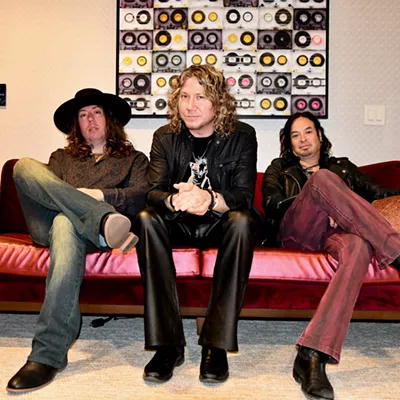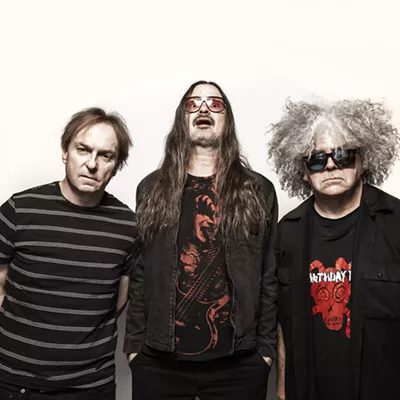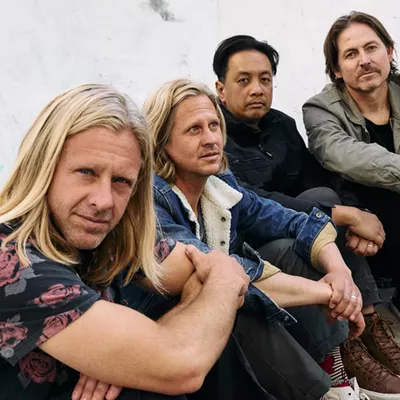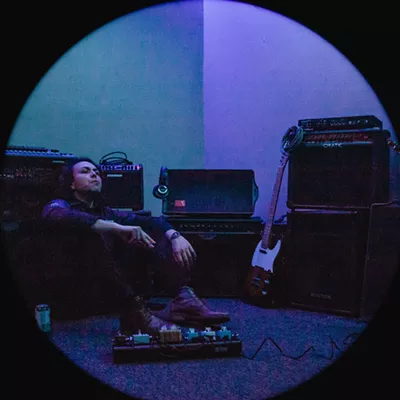Under the leadership of the visionary guitarist Makoto Kawabata, the band is technically an outgrowth of the Acid Mothers Temple Soul Collective, which includes by definition a collaborative performing arts company, its communal home, a quasi-religious philosophy that is both singular and all-inclusive and, presumably, anyone who chooses to listen.
The whole approach strikes one as a combination of the satirical cult Church of the Sub-Genius and the ever-evolving lineups of Parliament-Funkadelic.
Originally, when AMT was formed in 1995, it was known by the complete moniker Acid Mothers Temple and the Melting Paraiso U.F.O. In 2005, after some artistic upheaval, the band goes by the name Acid Mothers Temple and the Cosmic Inferno, and it has just seen the release of its truly amazing new CD, Just Another Band From the Cosmic Inferno. On Important Records, naturally.
The disc contains just two tracks: "Trigger in Trigger Out," which is just more than 20 minutes long; and "They're Coming From the Cosmic Inferno," which clocks in at more than twice that length.
Both songs start with quiet washes of analog synthesizer, soon after which Kawabata explodes with wheel-spinning, rubber-burning garage-psych guitar showcases that alternate between righteous riffing and sustained, barely controlled soloing.
There's as much spiritual longing as there is righteous guitar shred and grimy punk fury. This album brings to mind the MC5 and the Stooges jamming with Eddie Hazel on Cosmic Slop under the influence of John Coltrane's Interstellar Space.
Occasionally, bassist Mitsuru Tabata bellows some unintelligible, but gloriously snarling, vocals. And the rhythm section actually swings, thanks in no small part to the fact that it boasts two drummers. Yeah, like the Grateful Dead and the Allman Brothers Band.
When was the last time you didn't want a 45-minute song to end? It's beautiful music. Really.
Japan in recent years has perfected the art of noise, thanks to such pioneering groups as the Boredoms, Melt Banana, Ruins and Kayo Dot. And Japanese guitarists in particular--including Keiji Haino, Otomo Yoshihide, Guitar Wolf, K.K. Null and Masami Akita--have explored atonality, dissonance and even good ol' melody at the furthest reaches of the known musical galaxy.
Kawabata keeps pace with all of them. He wasn't available to talk with the Weekly, but excerpts from his interviews on the band's Web site illuminate the artist behind the din.
In the beginning, Kawabata had no intention of forming a band, he says. He simply had a vision.
"The concept, in two words is 'trip music.' I have listened to all sorts of trippy psychedelic records, but I was never fully satisfied with them. So I began to want to create a really extreme trip music.
"It was also a great chance for me to try out all sorts of things in the studio, and so that first album is basically a solo record. I edited and overdubbed all these tapes of jam sessions we'd done, and ended up with something that is like musique concrete. That was why I never even thought about the group playing live. That record was really the first time that I realized my childhood dream of creating a music that fused hard rock and electronic music. And it's also that extreme trip music album that I always dreamed of making."
The process of music-making is primarily an improvisational one for AMT, and the magic is in the performance, he says.
"I dislike writing songs in advance. If you write songs then in order to make them perfect, you need to practice. But music is constantly changing, depending on time and place and atmosphere, and attempting to tie it down never breeds good results. Especially when a large group of people is playing together, the more fixed parameters that you have, then the less spiritual communication there will be between the performers, and the end result will be boring.
"When AMT play live, there is a rough theme for each song, but we are never sure how it will change from day to day. Playing to different people, in different places, on different days, there is absolutely no point in trying to decide things in advance. That's why tours are always so exciting for us."






